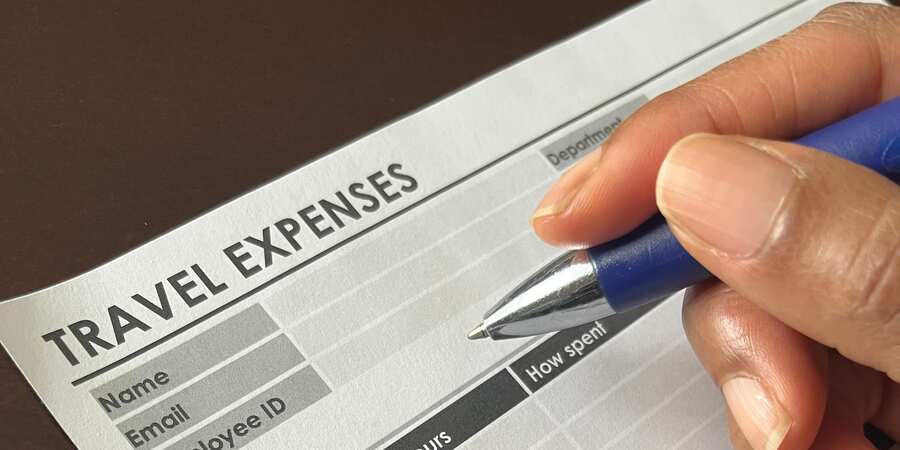Employees incur several costs during business trips or work related activities, like purchasing stationary for presentations, taking clients out on lunch, and more. Companies settle these expenses through reimbursements after the employee submits an expense report. Controlling business travel costs is crucial as work related travel expenses account for the top expenditure among all business overheads.
Managing travel costs by designing an effective travel expense policy is a critical function of a corporate travel manager. Most companies develop strategies to achieve cost efficiency in business travel by associating with regional LCCs and a chain of hotels for discounts. Continue reading to learn multiple aspects of work related expenses and ways to streamline corporate travel.
Knowing the basics of corporate travel expenses

Employees required to travel as part of their duties have to spend money to cover transport, accommodation, food, local transportation, communication, and other incidental expenses. We call these work related travel expenses. Corporate travel managers strive to streamline the reimbursement process by simplifying the approval methods to avoid delays.
Business travel is vital as it helps companies grow sales, ensure customer satisfaction, expand business horizons, enhance brand awareness, and control the working of branch offices. The work related travel expenses covering these objectives are essential expenses as these bring revenues to the organization.
Employees may pay for these expenses on the company’s behalf as they are away from the office and receive reimbursement on presenting proof of payments.
Categories of business travel expenses
Each travel expense for business travel must have a rationale to accomplish a business aim. These may include sales calls, training, seminars, trade fairs, company meetings, and service assignments. An organization’s travel policy must provide details of expense categories that an employee is eligible to claim for reimbursements. Usually, traveling expenses cover:
1. Transport Expenditure
Transport costs refer to expenses for air, road, or train journeys. These can also include fuel and maintenance costs for using a vehicle for business trips. One can also include parking fees, cab fares, and expenses for using public transport while on a business trip in another town. Commuting to the office from the residence is not a part of business travel.
2. Subsistence Expenditure
Employees on business trips have to spend on meals and drinks as they are in an outstation or away from their homes. These expenses are reimbursable as subsistence expenses on producing relevant receipts. The company may fix an upper limit of daily subsistence allowance to control costs.
3. Business Communications
Communication is crucial during business travel. Internet expenses and the cost of phone calls and faxes for business purposes are allowable travel-related expenses.
4. Accommodation Expenditure
Outstation business trips require an employee to stay in a service apartment, lodge or hotel. The work related travel expenses for accommodation cover the hotel charges for the employee or group of employees. Expenses of a friend’s or relative’s accommodation are not reimbursable. The employee need not spend on accommodation if the company has tie-ups with hotel chains or owns a guest house at the destination.
The employee can also claim reimbursement for incidental expenditures like stationery, tips, Wi-Fi charges, and laundry. Expenses for personal reasons like shopping or fines for wrong parking, or other reasons do not qualify for reimbursements. Also, to successfully reimburse these expenses, one must have proper work related travel expenses without receipts.
Travel policies to streamline business travel expenses

Policy for work related travel expenses should provide a smooth traveling experience so that employees are more productive. Business travel policies with employee-friendly guidelines help mitigate complexities of booking and provide easy tracking of employees. These are also vital for controlling travel costs while being fair to all.
You can enhance employee satisfaction by allowing a self-booking option for transport and accommodation. The new generation of the workforce is comfortable using smartphone apps for accessing various travel booking platforms. Hotel booking services can be helpful to get the most out of their business travel as they have the freedom to choose accommodation. Organizations can use platforms like Paxes to achieve the same.
Companies can set limits for transportation and accommodation to ensure cost savings while allowing freedom of booking for employees.
How to manage travel expenses in corporates

Work related travel expenses cover a broad spectrum of categories. It can complicate the travel policy, resulting in confusion and an additional workload for travel managers to revise the policy from time to time.
Corporate travel managers usually complain about the non-compliance of travel policy, despite making it simple and user-friendly. Most employees are not comfortable with manual expense report preparation and submission.
Besides, finance departments struggle with approvals as employees keep pressing for quick reimbursements.
Using a SaaS-based expense management platform helps remove complexities of travel-related expense management while improving travel policy compliance.
- The automated platform can maintain records for travel expenses to improve the company’s audit readiness. Continuous monitoring facilitates deductions for tax benefits.
- Justifying the business purpose of work related travel expenses is easy, as the platform allows tracking every single expense.
- Travel managers can instantly access category-wise expenses to revise policies for better cost efficiency.
- The platform has a facility of a smartphone app to help employees enjoy the freedom of booking transport and accommodation.
- The app is also helpful for the instant submission of expense reports for quick reimbursements as the platform automates approval workflows.
Suggested Read: How Can Organization Manage Business Travel Budget
Conclusion
Managing work related travel expenses is highly essential for the reimbursement process of an organization. Further, travel managers need to set limits on travel expenses and state a clear travel policy to act as look-ups for traveling employees. Finally, efficient management of these travel expenses lead to enormous cost and time savings for an organization.
Work-Related Travel Expenses FAQs
What is business travel important?
Business travel is very important as it helps companies to increase sales, ensure customer satisfaction, expand business horizons, increase brand awareness and manage branch operations.
What are the types of business travel expenses?
There are four types of business travel expenses, namely: Transport expenditure Subsistence expenditure Business communications Accommodation expenditures
What can be included and cannot be included in the transport expenditure?
Parking fees, taxi fares, and public transportation charges for business trips to other cities can be added. Traveling from home to the office cannot be included in business travel.
Which travel policy can help in employee satisfaction?
The satisfaction of employees can be achieved by giving them the freedom of self-booking means they can make travel bookings as per their choice.
How can corporate have efficient travel expenses?
A SaaS-based expense management platform can help you reduce the complexity of travel-related expense management while improving travel policy compliance. It can help in making bookings online, being accessible on smartphones, maintaining records, and submitting reports.



